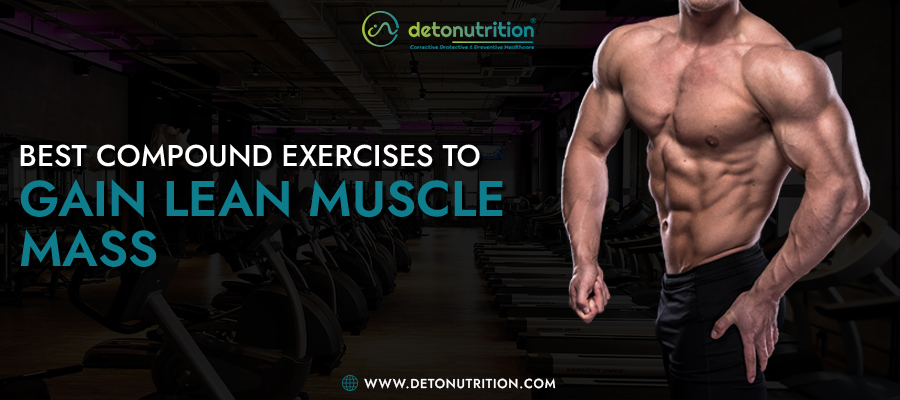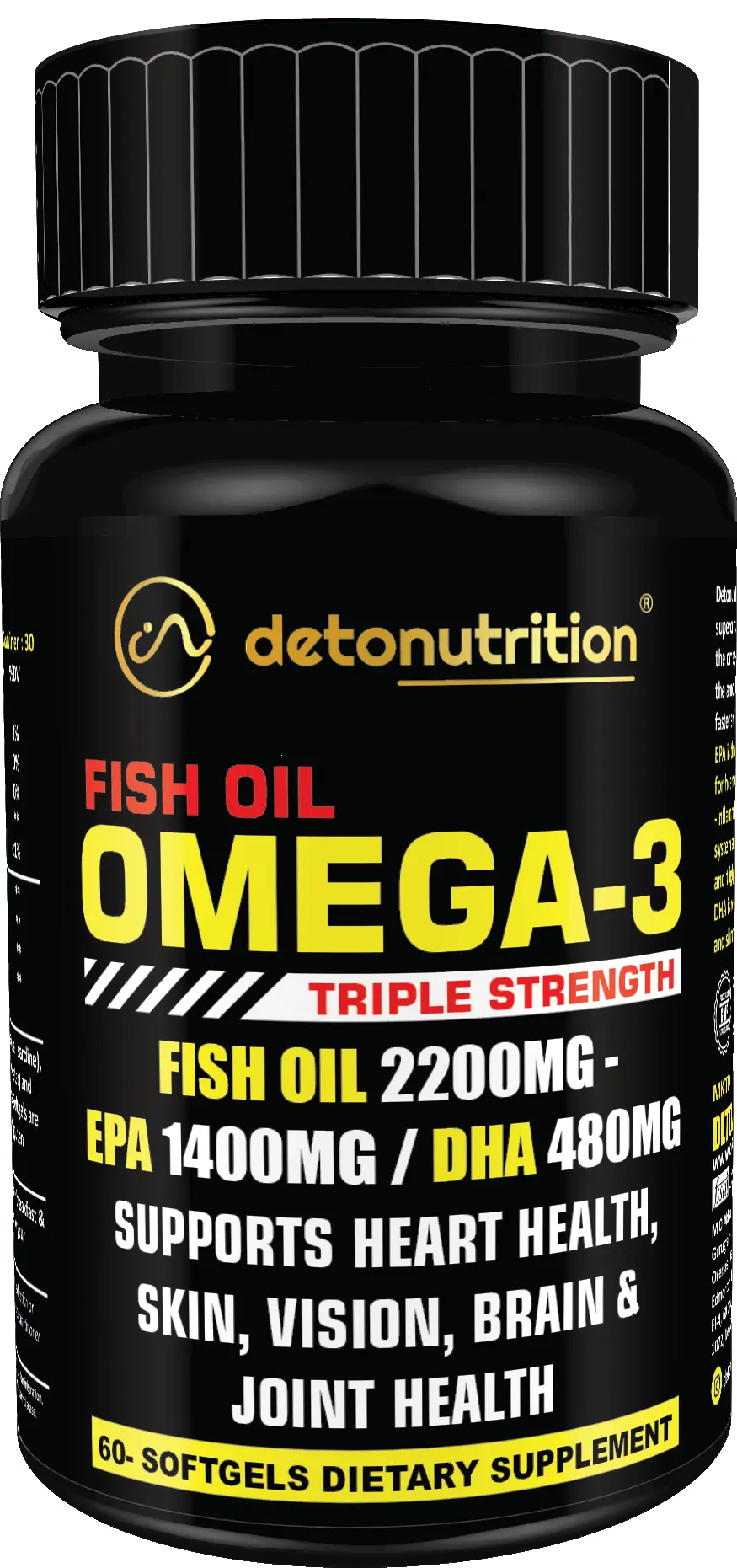Best Compound Exercises To Gain Lean Muscle Mass
Did you ever felt like you're giving too much effort at the gym but seeing slower progress than you expected? Well, if you're not seeing the results that you hoped for, the answer might be simpler than you think. For a long time, the go-to strategy in the fitness world was all about the idea of working one muscle at a time such as bicep curls, tricep extensions, & calf raises etc. These exercises definitely have their place, but they didn’t give the desired result faster. As working on only one muscle is like trying to build a strong house by just focusing on individual bricks, completely ignoring the foundation, which isn’t an efficient thing. To get the gains you want often comes down to changing your approach and focusing on compound exercises. Compound exercises use several muscle groups at once which make the muscle building process effective and efficient. Read on this blog to know the benefits of compound exercises and the top seven compound exercises to gain lean muscle mass.
Benefits of Compound Exercises
-
Maximum Muscle Groups Engagement
When you perform a compound exercise, you’re not just working one or two muscles, you’re using several muscle groups. This will activate muscles that lead to greater overall muscle growth and strength gains.
-
More Calorie Burn
More muscles working means more energy expended. Compound movements are metabolic powerhouses, helping you burn more calories during and after your workout, which is crucial for staying lean while building muscle.
-
Enhanced Functional Strength
Our lives aren't spent in isolation. We lift, push, pull, and squat in various contexts. Compound exercises directly improve functional strength, making everyday tasks easier and reducing the risk of injury.
-
Increased Hormonal Response
The demanding nature of compound exercises stimulates a greater release of anabolic hormones like testosterone and growth hormone, which are vital for muscle protein synthesis and overall recovery.
-
Improved Coordination and Stability
Because these exercises involve multiple joints and muscle groups, they significantly improve your body’s coordination, balance, and core stability.
Top Seven Compound Exercises For Lean Muscle Growth
1. Squats: The King of All Exercises
If there’s one exercise that you must include in your routine, it’s the squat. Whether you opt for barbell back squats, front squats, or even goblet squats, this movement is unparalleled for building lower body strength and mass. It targets your quadriceps, hamstrings, glutes, and even engages your core and lower back for better stability. It helps in developing muscular legs, builds a strong core, and improve a significant amount of hormonal response. Not forget to focus on depth as low as you can comfortably go while maintaining a neutral spine and keeping your chest up, the more better results you get.
2. Deadlift: The Ultimate Full Body Pull
The deadlift is another one of the best exercises for strength and muscle building. It’s a full body exercise that works your hamstrings, glutes, lower back, lats, traps, and forearms. It teaches you to lift heavy objects safely and efficiently from the ground, a skill that you can use in your everyday life. It builds incredible posterior chain strength, thickens your back, and boosts grip strength. The key tip is to maintain a flat back throughout the lift, hinge at your hips, and initiate the movement by driving through your heels.
3. Bench Press: Your Chest and Upper Body Powerhouse
For upper body mass and strength, the bench press is hard to beat. It primarily targets your chest, shoulders, and triceps muscles. Variations like incline bench press can further emphasize the upper chest. It is excellent for building a strong, muscular chest and powerful triceps. The main tip of this exercise is to keep your shoulder blades squeezed together, maintain a slight arch in your lower back.
4. The Overhead Press (Military Press): For Boulder Shoulders
If you want impressive, well rounded & powerful shoulders, the overhead press is your go to exercise. This exercise primarily works your deltoids, triceps, and upper traps, while also heavily engaging your core for stability. It not only develops broad and strong shoulders but also improves upper body pressing power.
5. Barbell Row: For a Thick and Muscular Back
Barbell row is often overlooked but a phenomenal exercise for building a thick, powerful back. It targets your lats, rhomboids, traps, and even your biceps. A strong back is crucial not only for aesthetics but also for injury prevention and overall posture. It creates a muscular back and improves pulling strength. The main tip for this exercise is to maintain a stable, slightly bent over position, pull the bar towards your navel, and squeeze your shoulder blades at the top of the movement.
6. The Pull Up (or Chin Up): Master Your Bodyweight
The pull up is the ultimate test of upper body pulling strength and a fantastic builder of the lats, biceps, and forearms. If you can’t perform full pull ups yet, start with assisted pull ups or negative pull ups and progressively work your way up. Chin up exercise is more emphasis on the biceps. Both chin-up and pull-up develops impressive back width and bicep strength using only your body weight. The main key for this exercise is to focus on pulling your chest towards the bar, and avoid using momentum to get up.
7. Lunges: Unilateral Strength and Balance
While squats and deadlifts are working on both legs simultaneously, lunges only work for one leg at a time. This makes them excellent for addressing muscular imbalances, improving balance, and developing functional leg strength. Lunges exercise will hit your quads, hamstrings, and glutes effectively. It’s best for building strong, symmetrical legs.
How to Integrating Compound Exercises into Your Routine?
So, how do you add these powerful movements into your training routine? Here’s what you can do:
-
Prioritize them
Always start your workouts with compound exercises. They require the most energy and focus, and performing them first ensures you’re fresh and can lift the heaviest weights safely.
-
Focus on progressive overload
To gain muscle, you need to continually challenge your body. This means gradually increasing the weight, reps, sets, or decreasing rest times over time.
-
Master your form
Before adding significant weight, ensure your form is impeccable. Watching videos, working with a qualified trainer, or even filming yourself can help identify and correct any issues. Poor form is a shortcut to injury, not muscle.
-
Listen to your body
While pushing yourself is important, recovery is just as crucial. Don't be afraid to take rest days when needed.
-
Combine with isolation movements (strategically)
While compound exercises are the foundation, a few targeted isolation movements can complement your training by addressing specific muscle groups or weaknesses.
Other Important Factors For Muscle Growth
Building lean muscle isn't just about what happens in the gym. It's a holistic approach that demands attention to several other critical factors:
-
Nutrition is the King
You can lift all the heavy weights in the world, but if your diet isn't on point, your muscles won't grow. Prioritize adequate protein intake (around 1.6 to 2.2 grams per kilogram of body weight), complex carbohydrates for energy, and healthy fats. Don't forget your micronutrients from fruits and vegetables.
-
Sleep is Your Secret Weapon
Muscle growth and repair primarily happen during sleep. Aim for 7 to 9 hours of quality sleep per night. Don’t forget that improper sleep will hinder your recovery and progress.
-
Consistency is Non-Negotiable
Results don't happen overnight. Building muscle is a marathon, not a sprint. Show up consistently, even on days you don't feel like it. Small, consistent efforts compound over time.
-
Add Supplements
Taking herbal supplement is the best decision to make as it will help you gain lean muscle mass without any side-effects and gives you more energy for workouts.
-
Stay Hydrated
Water plays an important role in every bodily function, including muscle contraction and nutrient transport. So, drink plenty of water throughout the day to keep yourself well-hydrated.
Conclusion
Embarking on a journey to gain lean muscle mass is incredibly rewarding, both physically and mentally. By shifting your focus to the power of compound exercises, you’re not just building bigger muscles, you’re building a stronger, more functional, and more resilient you. These movements will challenge you, push your limits, and ultimately, help you sculpt the physique you’ve been working towards. So, step into the gym with purpose, embrace the challenge of these foundational movements, and watch your body transform. Remember, it’s about working harder as well as smarter.

We have a vision to take good care of your health and nutrition with products which are made from research and experience. Our team is technical as well as experienced so that we can deliver you the best products for your health and wellness.
Stay Fit, Stay Healthy And Stay Happy Always!
QUICK LINKS
CATEGORIES
Subscribe Us
Subscribe to Dr. Aaditya's Health Blog Email Newsletter
© Copyright - Detonutrition. All Right Reserved 2026.




